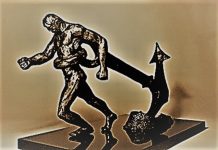During times of prayer, I felt as though the Lord spoke to me about humility. Since true humility is probably one of the least demonstrated characteristics in the church, understanding exactly what it is supposed to look like seems somewhat elusive.
In reading the scripture, the importance of humility cannot be overstated, and it would seem that in modern Christianity it is grossly under-emphasized. Psalms says that God guides the humble in what is right, while Proverbs says that He gives grace to the humble. It goes on to tell us that with humility comes wisdom, that humility comes before honor, and that God exalts the humble, while He brings the proud low.
The New Testament contains numerous passages which command us to be humble. Ephesians says to be completely humble, and gentle. Philippians says that in humility consider others better than yourself. 1 Peter tells us to clothe ourselves in humility. While Titus tells us to show “true humility” to all men.
Nothing in the scripture would indicate that this is optional, so if we are destined to be conformed to the image of Christ, we must come to an understanding of what “true humility” is. To that end, I believe that the Lord put His finger on two key passages of scripture to aid in coming to an understanding of what humility is, and isn’t.
The first scripture is found in the gospel, where Jesus told us that, “apart from me you can do nothing”. This seemed to be a pretty obvious passage. Certainly, a willingness to take matters into our own hands speaks of pride, which is generally considered the antithesis of humility.
There is something in our nature that struggles to admit our dependence on anything other than ourselves, much less our “complete dependence”. We find the image of the “self-made man” appealing, while the idea of being “dependent” is unattractive.
Most of us seem to segregate issues in our lives into those which we perceive we can handle on our own, and those which are God issues. Of course the scripture doesn’t give us that option, it limits our independent efforts to “nothing”.
The great stumbling block to humility would seem to be pride. In my own walk with the Lord there seems to be a never ending battle with issues of self-sufficiency. At first I was confused by this battle, because I always thought of pride as thinking too highly of yourself, while I’ve really struggled more with issues of low self-esteem. But I’ve come to realize that at the root of pride you’ll often find insecurity, fear, and sometimes hurt. I see that in the areas where I haven’t come to an appreciation of who I am in Christ, that I often try to derive my worth from other things (e.g. works, accomplishments, status…).
When we seek our worth in these things, it becomes false pride. I see that my insecurity causes me to want to cover up my weaknesses, and to portray an image of strength where I’m not strong. For those who’ve been deeply hurt, these illusions are often a survival tactic, or a defense mechanism.
Another aspect of this is when we attempt to create an image to conceal those things that we find unacceptable in ourselves, so that we might be found acceptable in the eyes of others. These images (or masks) are really just fear and insecurity, manifesting themselves as pride.
I’ve observed that the most arrogant people I’ve ever met are also the most hurt, and/or insecure. They’ve normally created an illusion of who they are, and how they want to be viewed; and they lash out at anything that threatens to damage that illusion. While these types of people often seem powerful and confident, a deeper look shows something quite different. It is helpful to understand this because finding the root of pride will help in getting to the root of humility.
The second scripture was not as obvious to me, which is where Paul writes to the Philippians, “I can do all things through Christ who strengthens me”. This scripture is very empowering, and the understanding of it would almost seem to tempt me to be prideful, but I believe that the Lord showed me that when these two scriptures come together you have a recipe for “true humility”.
To understand how this scripture fits, we need to understand what humility is not. There are many traits that are often mistaken for humility, which I don’t believe match up with the humility that God is calling His people to. Traits such as timidity, passiveness, indecisiveness, and low self-esteem are often mistaken for humility. We know that God did not give us a spirit of timidity, that He’s called us to be more than conquerors, and a royal priesthood.
The Bible holds up Moses as a picture of humility, and yet we see him boldly going before Pharaoh, decisively leading the nation, and conversing with God in a way that no other man had. These are hardly the images that we associate with humility, and yet, they fit perfectly within two these scriptures. I believe that the Lord is saying that true humility is bore out of being secure in our identity in, and relationship with, Him.
When we understand that apart from Him we can do nothing, we don’t try to take credit when things are accomplished (nor the blame when they’re not). When we understand who we are in Him, we don’t have anything to prove to other people, and we don’t need to create some image to be found acceptable, because we’ve already been found acceptable in Him. When we understand His sovereignty, and that we don’t have anything to fear, we don’t feel the compulsion to try to control our circumstances.
If we could arrive at this place, we wouldn’t have to fight for our position, because we’d have confidence that God would raise us to the place He wants us. We could always assume the servants role, and allow God to exalt us as He sees fit. We would be free from the bondage of what others think, because we’d understand that only our Father’s opinion really matters. We could be full of grace for others because we’d understand the grace He’s had with us, and we’d have confidence in His righteous judgment to come. We wouldn’t have to be anxious that our needs won’t be met, because we’d understand that He is our portion.
The picture of humility that the Lord showed me isn’t one of being beaten down and hungry, but one of freedom and peace. He showed me David dancing before the ark. While his wife asserted that this was no way for a king to act, David understood that in the presence of the Lord, he wasn’t the king. He recognized that in the Father’s presence he was simply a child, and that this was a perfectly normal way for a child to act before his Father.
It shows that David’s identity was more wrapped up in being a child of God than in being the King of Israel. He showed me David standing over Saul’s sleeping body with a spear in his hand. David had been given the prophecy that he’d be king, he knew that Saul had lost favor with God, God had empowered him to kill Goliath, God had raised him up as a leader in the nation, and he was surrounded by men telling him that God had delivered Saul into his hands, yet he would not presume to take the role of Saul’s executioner without first hearing from God.
This demonstrates David’s confidence in God’s plan to make Him king, his belief in the word that was spoken over him, his understanding that he didn’t need to manipulate the situation in his favor, and that apart from God, he was not commissioned to act.
I feel like the Lord showed me that this is the picture of humility that He’s calling us to. Not a picture of weakness, but of confidence in Him. Not a picture of insecurity, but of security in our relationship with Him. Not a picture of timidity, but of boldness in the things He’s commissioned, and empowered us to do.
In the end, the truest picture of humility is Christ Himself. How could He come down from heaven, take on the form of a man, allow mere men to scorn, and reject Him. How could He take on the role of a servant to beings that He Himself had helped to create, and endure the suffering and humiliation of the cross?
It was His understanding of who He was, and His complete trust in the Father that allowed Him to be humbled before men. If it was so for Him, and if we are to be conformed to His image, then it must be so for us as well. God I pray that you would give us humble & contrite hearts, so that you might be glorified, and served.
Bryan Corbin
br**********@********po.gov










































[…] In English https://godsleader.com/humility-the-forgotten-gift/ […]
[…] Humility, The Forgotten Gift […]